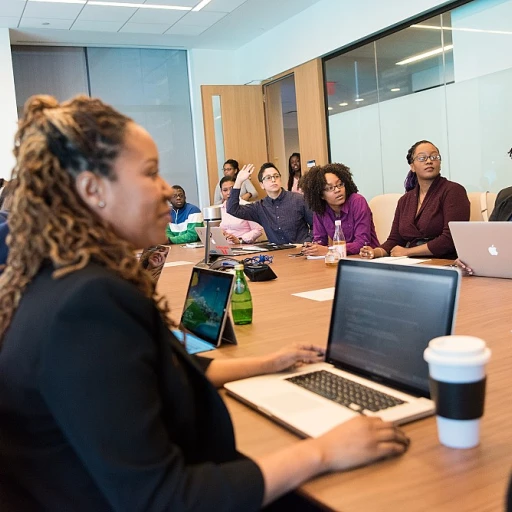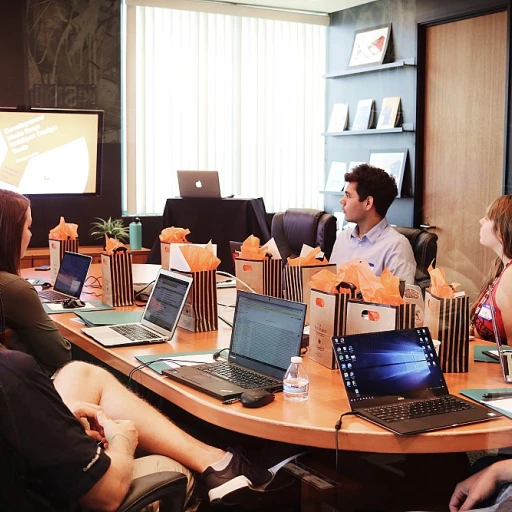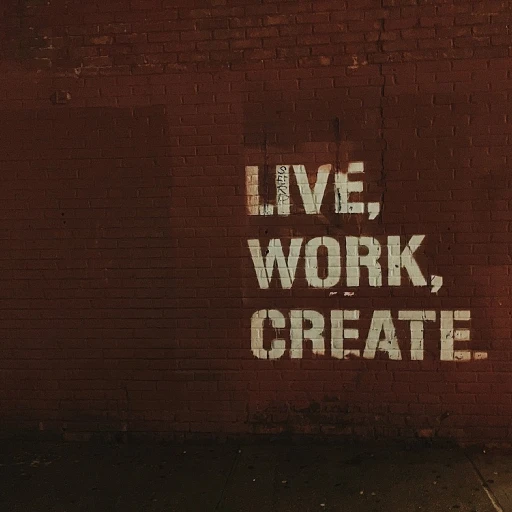
Understanding the Role of a Chief Human Resources Officer
Diving into the World of High-Level HR Leadership
Understanding the role of a Chief Human Resources Officer (CHRO) is crucial for anyone aspiring to climb the ladder in the HR field. As a strategic leadership position, a CHRO has the responsibility of aligning HR functions with the broader objectives of the company. This position isn't just about managing people but also about influencing the company’s strategic decisions. The CHRO’s responsibilities include overseeing talent acquisition, which involves crafting strategic interview questions to assess the skills and potentials of candidates. Interviewing is not just about assessing a candidate’s resume; it’s about understanding their ability to fit into the company's culture and long-term goals. A Chief Human Resources Officer needs to always think strategically to enhance the company’s competitive edge through its people. Successfully navigating this role requires a profound understanding of diverse elements involved in the hiring process. This includes knowing how to ask questions that delve beyond traditional credentials, such as a candidate's problem-solving skills or how they describe a situation to exhibit their soft skills. It’s about knowing what to observe in a candidate's answer to assess their true fit for the job. Navigating this career path prepares individuals to lead HR teams effectively and contribute to decision making. A CHRO doesn’t only manage the HR team but also ensures that the team’s actions align with the company's overarching business strategy. The role is career oriented towards fostering a work environment that promotes growth, innovation, and sustainability within the company. To excel in a CHRO role, one must continuously evolve their ability to adapt and change, especially considering the dynamic and rapidly evolving work environment. For more insights into maximizing business impact through strategic leadership in HR, explore inorganic growth strategies that align with modern day requirements.The Importance of Strategic Interview Questions
Developing Questions with Strategic Depth
Crafting strategic interview questions is a crucial element in hiring a Chief Human Resources Officer (CHRO). It involves outlining questions that go beyond the standard interview inquiries and delve into meaningful topics that relate directly to the strategic goals of the company. The focus should be on uncovering a candidate's capacity to drive long-term success. To approach this thoughtfully, hiring managers must understand that the purpose is to not only assess the candidate's qualifications on paper but to gauge their ability to adapt, lead, and solve complex problems in a dynamic work environment. This can be achieved by formulating questions aimed at:- Evaluating how candidates have previously navigated challenging situations. A question might be: "Can you describe a time when you had to make a difficult decision with limited information?" This can reveal problem-solving skills and decision-making capabilities.
- Understanding a candidate's vision for the role by asking: "How do you see your career progressing over the next five years within our company?" Such strategic questions uncover long-term career orientation and commitment.
- Analyzing a candidate’s ability to foster a positive team environment with a question like: "How have you handled diversity, equity, and inclusion initiatives in your previous roles?" This aligns with enhancing DEI strategies in HR leadership.
Key Competencies to Assess in Candidates
Identifying Essential Skills for the Role
In the strategic interview process, assessing a candidate's key competencies is vital for a successful hiring decision. Recognizing the skills that are fundamental to the role of Chief Human Resources Officer (CHRO) helps in crafting precise questions that align with the company's objectives.
When evaluating candidates for a CHRO position, hiring managers need to focus on both the technical and soft skills necessary to thrive in the position and within the specific work environment of the company. Here are essential competencies to assess during the interview:
- Strategic Thinking: Candidates must demonstrate the ability to think big picture and align HR strategies with the company's long-term goals. This requires probing questions to see how they have successfully implemented strategic changes in past job roles.
- Leadership: The ability to lead a diverse HR team is non-negotiable. Craft questions that will help uncover past leadership experiences and how they motivate their team members under different situations.
- Communication: Strong communication skills are crucial for a CHRO, as they frequently act as a bridge between employees and executives. Candidate answers to questions about conflict resolution and stakeholder engagement can be very telling.
- Problem-Solving and Decision Making: Evaluate a candidate's experience in resolving complex HR issues and making informed decisions. Describe a time when problem-solving skills were integral, and how those experiences improved workplace outcomes.
It's equally important to include various interview questions that not only test these competencies but also explore how candidates may handle change in the organization. Strategic questions should delve deeper into a candidate's adaptability and vision, assessing whether they possess a career-oriented mindset that can fuel the organization's growth.
Crafting Questions for Leadership and Vision
Designing Insightful Leadership and Vision Questions
Crafting effective interview questions for a Chief Human Resources Officer (CHRO) role requires a keen understanding of the leadership and vision that the role demands. When assessing candidates for such a strategic position, it's essential to employ interview questions that delve into their ability to lead, inspire, and set a transformative direction for the HR team and the company as a whole.- Assess Leadership Style: To gauge an individual's leadership style, you might ask questions that require the candidate to describe a time when they successfully led a significant organizational change or navigated a complex work environment. Their responses can reveal their strategic vision and approach to leadership.
- Understand Decision-Making Process: A candidate’s decision-making skills are critical. Pose questions that require them to share a situation where they had to make a tough call under pressure. Their ability to articulate their thought process can provide insights into their strategic thinking and problem-solving skills.
- Evaluate Long-Term Vision and Strategy: Ask questions focused on long-term planning, such as how they align HR strategies with broader company objectives. This can help assess the candidate's foresight and career-oriented approach to their role.
Evaluating Adaptability and Problem-Solving Skills
Assessing Flexibility and Solution-Finding Efficiency
In today's dynamic work environment, adaptability and problem-solving skills are paramount for any candidate seeking a strategic role, such as that of a Chief Human Resources Officer. When crafting interview questions, it's crucial to design inquiries that help hiring managers effectively assess a candidate's ability to think on their feet and navigate complex situations efficiently. One approach to evaluating these competencies is through strategic questions that delve into past experiences and decision-making processes. For instance, you might ask a candidate to "describe a situation where you had to adapt quickly to a significant change in your job." This question not only requires candidates to recount a real-life scenario but also reveals how they approach sudden challenges and adjust their strategies accordingly. Such insights can be invaluable for understanding a candidate's adaptability quotient. Another robust interview question that can reveal problem-solving prowess is to "describe a time when you faced a difficult problem at work and the steps you took to resolve it." This type of query allows candidates to walk you through their thought process, offering a window into their problem-solving mindset and ability to implement effective solutions under pressure. By incorporating these strategic interview questions into your hiring process, you can better assess a candidate's suitability for the long-term goals of the company. The ability to adapt swiftly, identify problems, and devise viable solutions is not only crucial to successful leadership but also a marker of a career-oriented individual ready to contribute to a company's growth. Ultimately, focusing on adaptability and problem-solving skills during the interview process aids in selecting candidates who will thrive in a team setting and support the company's strategic ambitions over time. This method ensures that you are not only evaluating soft skills but also selecting candidates who are equipped to lead with vision and purpose.Incorporating Behavioral and Situational Questions
Incorporating Behavioral Insights: An Effective Interview Strategy
In the dynamic world of human resources, understanding a candidate's past behavior can be insightful for predicting future performance in their potential role. Behavioral interview questions offer a window into how candidates have approached diverse challenges in their careers. When hiring managers pose these questions, it enables them to tap into the candidate's intrinsic skills and abilities, crucial in assessing their fit within the company. Behavioral questions are rooted in the idea that past conduct is a reliable indicator of future behavior. Therefore, these questions are designed to elicit detailed responses, revealing how candidates think, react, and solve problems in real-world situations. These insights can be pivotal in the hiring process, especially for roles requiring strategic decision-making and problem-solving skills. In crafting behavioral interview questions, consider the following strategies:- Use the STAR Method: Frame your questions to guide candidates in structuring their answers using the Situation, Task, Action, and Result format. This clarity allows you to see a complete picture of the candidate's problem-solving process.
- Focus on Soft Skills: Queries should delve into critical soft skills such as teamwork, adaptability, and communication. Questions like "Describe a time you had to navigate a significant team conflict" can reveal a candidate's ability to handle interpersonal challenges in a work environment.
- Probe for Strategic Thinking: Pose questions that challenge the candidate to demonstrate their strategic mindset. For instance, "Tell me about a situation where you had to develop a long-term strategy to improve team performance." This helps assess their foresight and how they can contribute to the company's future.













